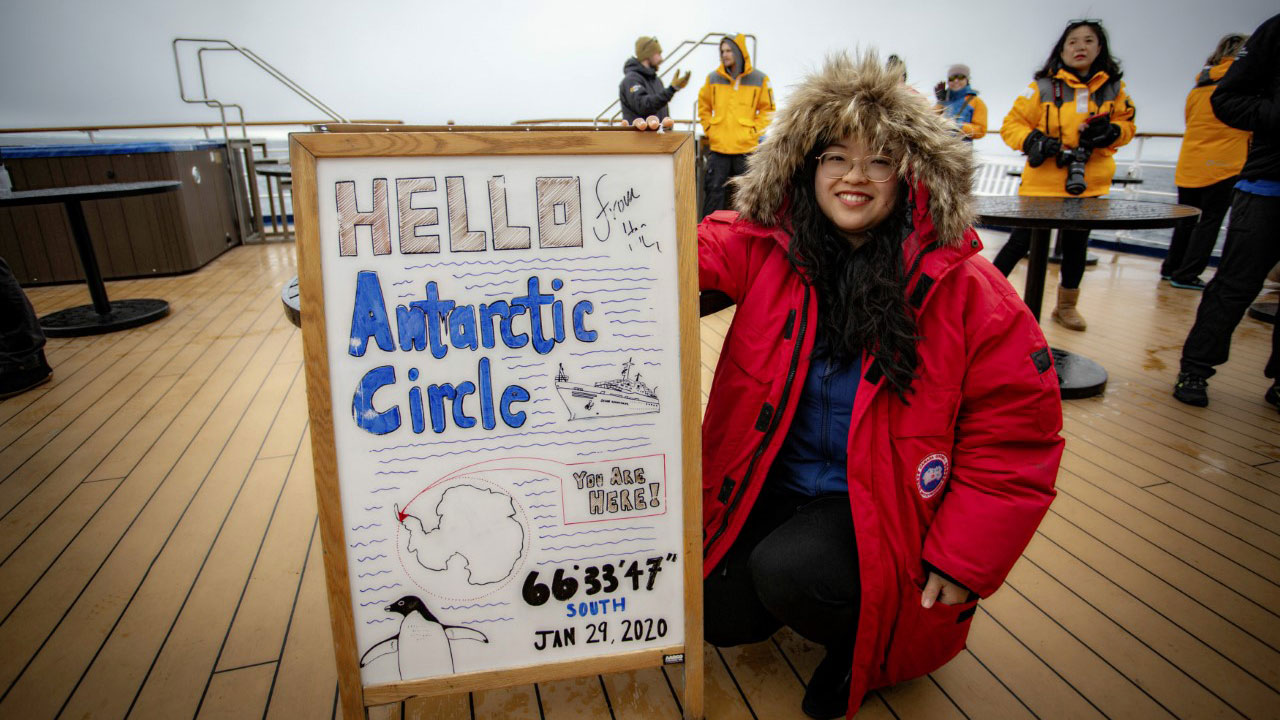This case study was created prior to the current situation - the team is currently grounded in Argentina due to travel restrictions, but are looking forward to getting back to work in the coming months.
Interpreters are used to travelling to far-flung places and living out of a suitcase. For many freelance interpreters it simply comes with the job.
Few interpreters, however, can boast having worked in and around what is considered to be the world’s most unchartered and mysterious continent, a place where until recently only the most intrepid explorers had dared venture to.
Antarctica tours
In the past few years, several University of Bath graduates from the MA Interpreting and Translating (MAIT) course have been hired by a company specialising in tours to Antarctica to interpret between English and Chinese for Chinese-speaking travellers.
Typically these trips start from the southern Argentinian city of Ushuaia and take in the South Shetland Islands, Drake Passage and the Antarctic Peninsula. Sometimes journeys stop at the Falkland Islands before continuing to South Georgia, where landings allow passengers to explore sub-Antarctic plants and wildlife.
Once near Antarctica, the journey takes the ship past breathtaking icebergs, where passengers might catch a glimpse of killer whales, humpback whales or minke whales blowing, breaching or spy-hopping at close range.
Life on board
A typical day for our hardy interpreters would start with a wake-up call at 6.50am in the Control Room.
The Expedition Leader would have a sheet of paper with the current temperature, wind speed, coordinates and a short introduction of what to expect for the day, which would then have to be announced on the PA system in Chinese.
During the day, interpreters were expected to interpret for presentations and lectures on a wide range of topics from safety operations and biosecurity requirements to marine biology, glaciology, microbiology, geology and ornithology, as well as facilitating communication during the landings (not easy when wearing three to four layers of protective clothing).
After that they are expected to translate the expedition journal and programme for the following day before finally going to bed for some much-deserved rest.
Despite the hardships of life onboard, the experience was one to remember.
Zhuofu Li
One of our interpreting graduates, Zhuofu Li, who spent 40 days in the region, welcomed in the New Year of 2018 as her team camped at Paradise Harbour, site of Argentina's Almirante Brown Antarctic Base:
'After finishing all my tasks, I would finally have time to arrange my own sleeping space. I would lie down on the ice, quietly observing the setting sun and the rapidly changing, colourful clouds.
'While sleeping during the bright night in such a tranquil background, we could hear the sound of icebergs breaking apart in the nearby mountains... It was such a special experience to stay so close to nature, enjoying the solitude amongst a group of teammates, and exploring the peace of nature and mind.'
Annie Allan
Annie Allan, another Bath graduate hired to interpret on a separate expedition, was equally enthralled by the magic of the scenery:
'Port Stanley on the Falkland Islands was as quaint and tranquil as any typical English country village.
'The Salisbury Plains of South Georgia had snow-capped mountains in the background and lush green at the front by the beach where hundreds of fur seals, elephant seals, black-browed albatross, and 250,000 king penguins meet and greet us as soon as we stepped off the Zodiac.
The frozen continent itself has a majestic, rolling landscape studded with crystal blue glaciers. Words can never do these places justice.'
Gang Cheng
We also managed to reach Gang Cheng, another of our MAIT graduates who is currently in Antarctica on an interpreting job. He said:
'Getting pettily pecked by penguins, bluff-charged by seals, and sprayed in the face by the blowholes of nearby whales, I am amazed by how far interpreting can take me, both geographically and experience-wise. This is the only place I can confidently boast: I am the best interpreter on the continent now!'
Interpreting training at Bath
Annie and Zhuofu felt that their training in interpreting and translating were crucial to prepare for such a trip.
Zhuofu remembers that intensive training in Bath and unlimited access to the University’s interpreting booths really helped her hone her interpreting skills:
'This not only helped me pass the highly competitive selection process to qualify for the expedition, but also equipped me with the ability to quickly adapt to a very busy interpreting schedule for a prolonged period of time'.
Zhuofu also said that the course taught her 'detective-level’ research skills, which enabled her to find useful information despite the limited books and internet resources in Antarctica.
